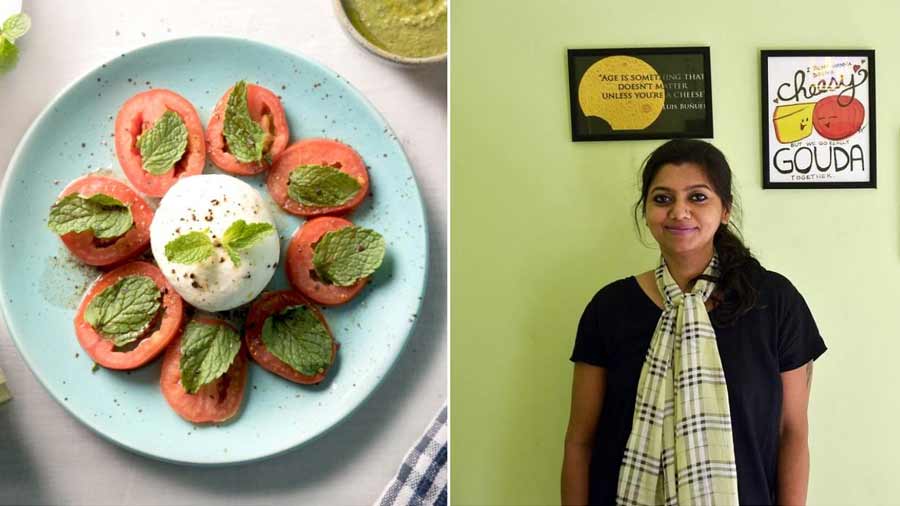During a chat with My Kolkata about the instant food culture, artisanal cheesemaker Arpita Nag brings up Alex Gibney’s Netflix documentary Cooked. The four-part series explores how modernisation created a toxic gap between humans and cooking.
“Following World War II, the food industry worked towards minimising the act of cooking and made it seem fashionable. People the world over considered it to be trendy and this created a market for packaged items, which bolstered the food industry. This also meant people were consuming heaps of chemicals they wouldn’t otherwise eat or ingest if they were cooking for themselves or growing their own food. This awareness is now consistently growing among consumers,” shares Nag.
It all comes down to time, of course. Be it ageing a block of gouda or cooking a meal from scratch — clean eating or even a conscious pantry is all about investing time and effort for making a bigger change. The process of maturing cheese is veiled in mystery for many, since it carries the key to its flavour. The ageing process, known as affinage, comes from the French word ‘affiner’, which means ‘to refine’ and it involves quite a bit of temperature control, salt monitoring (or light brine washing) and constant supervision of humidity, acidity and moisture levels.
“A matured cheddar can be aged for 8-12 months (although it’s an acquired taste). There are different kinds of moulds that grow on it which make it so interesting. Certain cheeses, the more they mature, the more flavourful they get,” reveals the cheesemaker whose label Meraki - Artisan Cheese & Rustic Bakes turns three this year.
Say cheese
The Indian market for cheese grew dramatically in the last year as urban buyers warmed up to trendy picks like pecorino and healthier options such as feta or even alt cheese. But the overall awareness about slow, fermented foods remains low as processed varieties and low-quality imports still dominate the market.
With her label Meraki, Nag has consistently tried to create room for non-synthetic cheeses that are free of emulsifiers and are thus non-toxic. From pickled feta to halloumi (semi-hard brined cheese) and even excellent matured gouda, all variants are meticulously aged by the cheesemaker in her South Kolkata studio.
A few weeks ago, Nag introduced a block of gouda on Instagram that was studded with freshly cut peppercorns. “This block matures for a minimum of 12 to 16 weeks. The colour on it will get darker and the flavour more intense. The punch will perfectly complement the creaminess of the paste inside. Now the question is whether we let it age further to pack in a stronger flavour and harder texture or cut it young? A classic ‘to be or not to be’ dilemma,” Nag shared. The affineur also revealed that the oldest cheese in her pantry at the moment is a manchego that has been aged for 6-7 months.
On the slow side...
The slow food movement that was started in the 1980s by Italian journalist Carlo Petrini was conceived as a direct antithesis to the fast-food culture which encourages people to prioritise convenience over everything else. But the last year changed many things, most notably people’s relationship with their food.
The cheesemaker believes slow foods are no longer considered pricey fads as Kolkatans are open to accommodating sustainable shifts, as evidenced by her growing client base.
“People would rather pay more and make sure they are putting the right things in their bodies, than going to the supermarket and spending money on processed options. This is definitely a positive sign. Things have changed in the past year, I think people are thinking about the bigger picture now and considering sustainable consumption as a long-time goal. So, artisanal cheese isn’t just a gourmet option anymore — it is slowly graduating into a staple,” Nag says.
When it comes to naturally matured cheeses, Kolkata still offers slim pickings. Despite mushrooming health food marts and upscale gourmet suppliers, it is particularly hard to source a simple bloomy rind in the city or even small-batch options. Meraki’s line of naturally ripened cheese is its biggest USP, along with rare variants like a charcoal ‘valencay’, for instance — a rustic French cheese, hand-shaped into cylinders and rolled into edible charcoal powder and aged for about 3 weeks. “A showstopper,” Nag calls it.
Back to the roots
Nag witnessed cheese-making for the first time in 2015 during her visit to Auroville. But it wasn’t until 2018 that she was able to go to Chennai to master the process herself. And in the coming year, the fromager hopes to engage with the production on a more grassroots level. “Early next year, a fellow cheesemaker and I are planning to spend some time engaging with different shepherd communities in the country who make cheese with goat and camel milk, starting from Western India. Hopefully, we’ll get started by January,” she reveals.
But before the new year dawns, Nag has a busy holiday season to navigate as people are ready with their antipasti orders and cheese board plans. “The festive season starts from Diwali and this goes on till spring. There are so many house parties happening and people love the versatility of cheese. Something like a camembert can be warmed slightly and it oozes beautifully and goes great on a cracker, while salads too can use cheese. With global cuisine opening up, everyone can now hunt for the very best ingredients,” Nag adds.
Party hacks: Hard cheeses like Parmigiano-Reggiano or manchego are most pairable with wine. But if you’re serving Chardonnay, opt for a semi-hard, buttery cheddar. For Pinot Grigio, explore softer variants such as mozzarella or mild Italian cheeses (which also work for antipasti platters).
